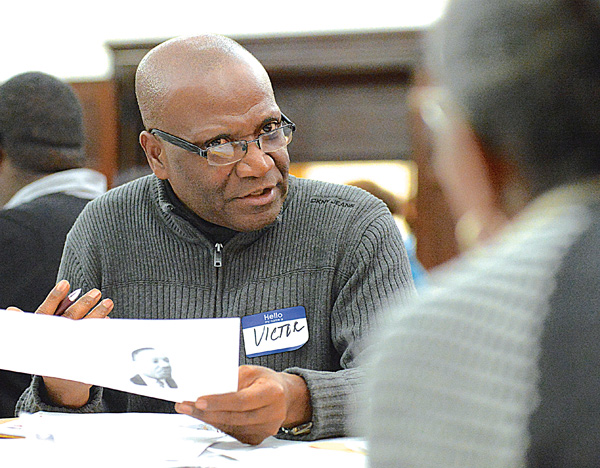Community workshop celebrates King legacy


Victor Wan-Tatah of Youngstown State University’s Pan-African Studies program discusses with participants at his table the strengths and weaknesses that can help or hinder people’s ability to live civilly in Mahoning County. The discussion was part of Monday’s 32nd annual Community Workshop Celebrating the Life & Legacy of the Rev. Dr. Martin Luther King Jr. at First Presbyterian Church.
Event honors life and legacy of Dr. Martin Luther King Jr.
By Sean Barron
YOUNGSTOWN
A smile brightened Micah Smith’s face when she thought about the impact Dr. Martin Luther King Jr. had on her life.
“Martin Luther King taught me how to be nonviolent and choose love instead of hate,” the Youngstown Early College senior explained, adding that such a transformation has allowed her to still love those who may persecute her.
A desire to celebrate the life and legacy of the iconic civil-rights leader, minister and humanitarian brought Smith to Monday’s 32nd annual Community Workshop Celebrating the Life & Legacy of the Rev. Dr. Martin Luther King Jr. at First Presbyterian Church, 201 Wick Ave., on the North Side.
Hosting the three-hour gathering, themed “Remembering What is Civil, Doing What is Right,” was the Martin Luther King Jr. Planning Committee of Mahoning County. The Rev. William Blake, director of Youngstown State University’s Office of Student Diversity, was moderator.
Alicia Reed, an Early College student, said she feels King’s legacy has left an imprint on the nonviolent protesters who demonstrated against the killing of black men in Ferguson, Mo., and New York City.
“He has made me more involved in the community,” added Serena Chatman, a YSU political-science major who hopes to be an Ohio state senator.
Chatman, Reed and Smith also have participated in Sojourn to the Past, a 10-day, five-state bus trip through the Deep South in which high-school students and adults learn about the civil-rights movement of the 1950s and ’60s and apply those lessons to their lives.
Making up the workshop’s panel were Barbara Ewing, the Youngstown Business Incubator’s chief operating officer; Jaladah Aslam, the King committee’s co-convener; Holly Welch, Choffin Career & Technical Center’s curriculum supervisor; and Jerome Justice, an entrepreneur who also owns Villa Shoe Store in Liberty Township.
Many regions with a single, dominant industry tend to have fewer entrepreneurial opportunities, noted Ewing, who added that it’s important to support “nuts-and-bolts” start-up businesses in the Mahoning Valley.
Such ventures often contribute to their area’s economic vitality, make it easier for some people to find jobs and bring added hope and a greater ability to correct certain social ills, she continued.
The most effective social-justice tool for changing unfair laws is the ballot, said Aslam, who called the low voter turnout for recent midterm elections “beyond pathetic.”
“We can protest police brutality, yet we won’t obtain an absentee ballot,” Aslam added, noting that voter turnout was high, however, among blacks for the 2008 and 2012 presidential elections.
To underscore her point, Aslam cited Edward Davis, who won a seat on Akron City Council by one vote in 1958.
“The moral responsibility to break unjust laws is alive today like it was in 1963,” said Welch, referring to the year King wrote his famous 20-page Letter from Birmingham Jail.
Welch recalled a history lesson at Choffin about King’s letter, saying that many of the students were deeply impacted and were asked to see how the lessons from that time applied to some of today’s challenges such as police brutality.
Nevertheless, many area schools remain segregated not just by race, but by economics, said Joe Meranto, Choffin’s executive director.
Too many students come to school hungry, devoid of medical coverage and with the sense that no one cares for them, which too often later makes it tougher for them to find work and easier to fall into a life of crime, he continued.
“Our schools aren’t broke; society is broke. Let’s fix poverty!” Meranto concluded.
Justice, an Ursuline High School graduate, said he’s always wanted to be his own boss and was happy to work long hours to build his business. He added that the Valley has many opportunities, partly because of relatively little competition from big retail stores.
Nevertheless, those interested in starting their own businesses should not let inevitable setbacks and disappointments stop them from such goals, he explained.
“If you don’t build your dream, someone will hire you to help build their dream,” Justice added.
The workshop also included roundtable discussions on what participants felt were the strengths, weaknesses, opportunities and threats regarding the area’s ability to thrive.
Responses included educating people on voting rights; listening to one another more carefully; establishing a smaller business incubator/plaza to promote greater opportunities; improving Youngstown’s marketability and challenging the notion that it’s a hotbed of crime; having a stronger retail presence in the inner city; setting up programs to help high-school students who might not be ready for college; including more young people in the political system; removing barriers to academic success such as rising tuition costs and draconian requirements for graduation; and treating one another more kindly.
 43
43
